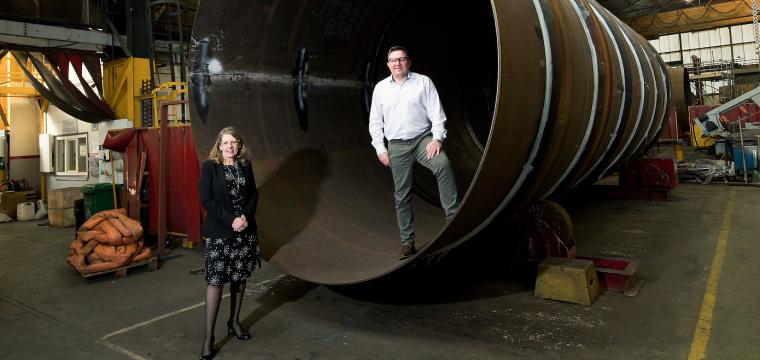Tees Valley’s local economy has been boosted by £100m thanks to the impact of nearly 80 investments over 11 years by FW Capital.
The investments, valued at over £22.5m, have helped SMEs in the area leverage private sector investment totalling over £77m, creating nearly 500 new jobs and safeguarding more than
1,000.
The investment into Tees Valley has been delivered through two of the funds FW Capital has under management. Nearly £16m was invested through the Northern Powerhouse Investment Fund – Debt Finance (NPIF) and a further £6.6m was invested through the Tees Valley Catalyst Fund (TVCF), which is managed on behalf of Tees Valley Business, the local growth hub for the Tees Valley and part of the Tees Valley Combined Authority. This fund helps businesses bid for new contracts by providing short-term loans.
Following the news that Teesside has been awarded Freeport status, the planned £23.6m investment into Teesside Airport and the forthcoming £34m upgrade to Middlesbrough train station, FW Capital is now looking to support an even greater number of businesses and their supply chains to develop and grow.
Joanne Whitfield, FW Capital’s Fund Director, said: “We’ve always been proud to be part of and support the business community in Teesside and it is fantastic to see the upward trajectory of this part of the region, which is testament to the hard work of Tees Valley Mayor Ben Houchen and his team.
“The investment into Teesside’s infrastructure will greatly improve connectivity. This is brilliant for the business base and its ability to compete so it’s no surprise confidence here is high. We want everyone to know we are here to provide support to SMEs as a long-term growth partner and while this £100m figure is an exceptional achievement, we’re now looking to do the same again.”
To date, the support that FW Capital has provided over the decade has enabled businesses to launch new products, expand office space, buy new or ground-breaking equipment, increase their workforce and bid for contracts.
Focused on its role as a long-term growth partner, many existing customers have received two or more funding rounds as FW Capital customers.
A good example is fabrication and engineering firm Francis Brown, based in Stockton-on-Tees. The business received a six-figure loan from TVCF in early 2021 which allowed it to fulfil bond requirements for a large contract. Following this, the business received funds from NPIF to enable it to secure jobs and expand further.
Jamie Brown, Francis Brown Ltd CEO, said: “The pandemic has seen us, like many businesses, trade throughout a difficult period of uncertainty. It has been hugely reassuring to know that FW Capital has been on hand throughout to provide funding and guidance. Thanks to them we are well positioned to fulfil our contract requirements, expand our workforce and achieve our growth objectives.”
Tees Valley Mayor Ben Houchen said: “As we emerge from the coronavirus pandemic, access to funding and support is critical to enable our brilliant businesses to fully recover and grow. Small and medium businesses are the lifeblood of our economy and I’m delighted our funding has played a part in helping to create and secure so many good-quality well paid jobs for the people of Teesside, Darlington and Hartlepool.”
Grant Peggie, Director at British Business Bank, said: “FW Capital has played an important part in the success of the Northern Powerhouse Investment Fund (NPIF), helping to deliver vital funding to small businesses across the Tees Valley and Cumbria since 2017. NPIF has played a crucial role in ensuring many businesses have been able to survive the pandemic and now can recover and rebuild. We congratulate FW Capital on reaching this milestone and with their help, alongside our other accredited fund managers, NPIF will continue to support growing businesses across the North.”
The Northern Powerhouse Investment Fund project is supported financially by the European Union using funding from the European Regional Development Fund (ERDF) as part of the European Structural and Investment Funds Growth Programme 2014-2020 and the European Investment Bank.


